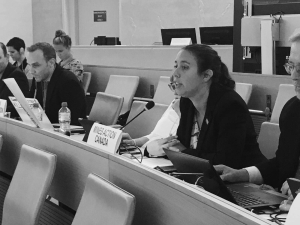On August 29, 2018, Mines Action Canada delivered the following statement at the Convention on Conventional Weapons Group of Governmental Experts on Autonomous Weapons Systems:
Thank you Mr. Chair. As co-founders of the Campaign to Stop Killer Robots, Mines Action Canada urge states to start negotiating new international law to create a new treaty to ban fully autonomous weapons and retain meaningful human control over the use of force.
As an organization from Canada, which has put a focus on Artificial Intelligence as a driver of our future economy, we see the prohibition of autonomous weapons systems as safeguarding public trust in AI and robotics.
This year’s Canadian trust survey by Proof – a polling and public relations firm – found that that only 39 per cent of Canadians trust that artificial intelligence will contribute positively to the Canadian economy, and even fewer women believe this to be true, at 36 per cent. Also, it found that only 25% of Canadians trust AI companies to do what is best for Canada and Canadians. These levels of public trust will present a problem for the commercial success of AI in the future.
Public trust in the technology is absolutely crucial to the transition from cool techy thing to an integral part of our lives. If the technology is weaponized, it will be so much harder to become useful part of our lives.
At yesterday’s side event, the panelist from the Future of Life Institute clearly outlined how scientists and relevant subject matter experts are concerned about the risks to the reputation of new technology from autonomous weapons systems and they are not worried about any risks a ban would pose to dual use technology. Protocol 4 of the CCW and the Chemical Weapons Convention has shown us that weapons can be prohibited without risking the development of beneficial technology.
I will conclude with a few words about the concept of risk. We have spent over five years, discussing autonomous weapons systems here at the CCW and throughout these talks, experts from around the world have outlined the risks posed by autonomous weapon systems – technological risks, humanitarian risks, security risks, moral risks and political risks. It is very clear that there are significant risks in developing autonomous weapons systems.
As we heard at a side event in April, the financial community makes its decisions based on risk, if an investment is too risky, you don’t do it even if the potential for a big payoff is there. We are constantly surprised that after hearing so many expert assessments that this technology poses high risks to civilian populations, some states are still object to development new IHL to prohibit AWS because maybe there will be tangential benefits from the technology.
It’s one thing to risk money, it’s another completely to risk other people’s lives.
High contracting parties should make the responsible choice in the face of overwhelming risk and start negotiating new international law to create a new treaty to ban fully autonomous weapons.
Thank you
